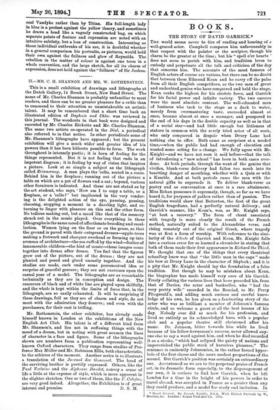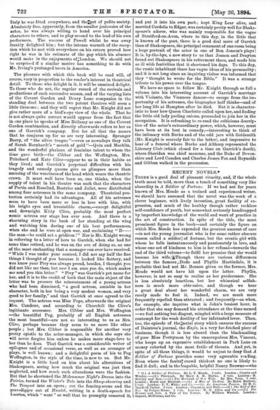BOOKS.
THE STORY OF DAVID GARRICK.*
THE world seems never to tire of reading and hearing of a well-graced actor. Campbell compares him unfavourably in that respect with the painter or the sculptor, though his charm be the greater at the time; but his "spell o'er hearts ' does not seem to perish with him, and tradition loves to embody and perpetuate all the talk and criticism of the day that concerns him. The accounts of the most famous of English actors of course are various, but there can be no doubt that between them Edmund Kean and he carry eff the palm from all their English competitors, as the two men of great and undoubted genius who have conquered and held the stage. Kean ranks the highest for his electric force, and Garrick for his facial power and infinite variety. The two careers were the most absolute contrast. The well-educated man of business who took to the stage as a duck to water, merely from overmastering taste, succeeded almost at once, became almost at once a manager, and prospered to the end of his days in the double capacity as well as in that of a social star—and had little enough but littleness of stature in common with the screly tried actor of all work, who only conquered in despair when Drury Lane had nothing else to offer. Both came as surprises at a needed time,—when the public had had enough of elocution and. wanted some acting for a change. We fully agree with Mr. Knight—and we have not seen it said before—that the talk of introducing a "new school" has been in both cases over- done. At both periods, through the want of the genius that vivifies, blank-verse delivery had fallen too much into its besetting danger of mouthing, whether with a Quin or with a Kemble. And at both periods came the men with the natural gifts to supersede it. To deliver blank-verse as poetry and as conversation at once is a rare attainment. Miss Rehan possesses it supremely, though, so far as we have heard it, for purposes of pathos rather than of passion. The traditions would show that Betterton, the first of the great English tragedians, had a perfectly natural delivery ; and Garrick's manner, like Kean's, was, as Mr. Knight says, "at best a recovery." The form of chant associated with tragedy is more clearly the result of the French method, naturally suited to the Alexandrine verse, and rising remotely out of the original Greek, where tragedy was at first a form of worship. With reference to the simi- larity of the debuts of Garrick and Kean, Mr. Knight falls into a curious error for so learned a chronicler in stating that both of them made their first appearance in Richard the Third. We thought that one of the things that every theatrical schoolboy knew was that "the little man in the cape" made his bow at Drury Lane in the character of Shylock ; and it is a pity that Mr. Knight should lay the foundation of a false tradition. But though he may be mistaken about Kean, the biographer has made himself very sure of his Garrick. Freely collating the various lives that have preceded his, from that of Davies, the actor and bookseller, who "had the very pretty wife" recorded in the Rosciad, to Mr. Percy Fitzgerald's, and adding much curious and careful know- ledge of his own, he has given us a fascinating story of the actor who was so brilliant a member of Johnson's famous circle, and so welcome a guest at all the best houses of his day. Nobody ever did so much for his profession, and lived so entirely as its acknowledged hero, with a popular club and a popular theatre still christened after his name. Dr. Johnson, bitter towards him while he lived because of his fellow-townsman's success, never allowed any- one else to say a word against him, and when he died recorded it as a stroke, "which had eclipsed the gaiety of nations and impoverished the public stock of harmless pleasure." The
sentence is eminently Johnsonian, in the rather forced hyper- bole of the first clause and the more modest proportions of the second. But Garrick's position was certainly an extraordinary one. Acenstomed as we are to the perpetual praise of French art, in its dramatic form especially, to the disparagement of our own, it is curious to find how Garrick, when he left London for a time in the height of his powers in order to travel abroad, was accepted in France as a greater than any they could produce, and a model for study and imitation. In
• David Garnet. By Joseph Knight, F.S.A. With Etched Portrait by W. Brecher, fr.c. London Kegan Paal and Co. 1834.
Italy he was fated everywhere, and the:pet of polite society. Absolutely free, apparently, from the smaller jealousies of the actor, he was always willing to hand over his principal characters to others, and to play second to the lead of his own performers. The success of Powell whilst he was away frankly delighted him ; but the intense warmth of the recep- tion which he met with everywhere on his return proved how right he was in his estimate of the gap which his absence would make in the enjoyments of:London. We should not be surprised if a similar motive has something to do with Mr. Irving's prolonged tours in America.
The pleasure with which this book will be read will, of course, vary in proportion to the reader's interest in theatrical detail. To those who delight in it, it will be unmixed delight. To those who do not, the regular record of the revivals and productions of each successive season, and of the varying lists of the Covent Garden and Drury Lane companies in the standing duel between the two patent theatres will seem a little tiresome ; and they will regret that Mr. Knight did not give rather more of a bird's-eye view of the whole. That he is not always quite correct would appear from the fact that in one place he speaks of Miss Bellamy as one of the Covent Garden combination, and directly afterwards refers to her as one of Garrick's company. But for all that the names that he conjures up for us are very interesting. Spranger Barry, of "the silver tongue "—even as nowadays they talk of Sarah Bernhardt's "mouth of gold "—Quin and Macklin, and the wonderful phalanx of feminine talent to whom the time gave birth—the Cibber and the Woffington, Mrs. Pritchard and Kate Clive—appear to us in their habits as they lived; and Garrick's perpetual difficulties with his tragedy and comedy queens give us glimpses more than amusing of the weariness of the head which wears the theatric crown. It must well have been so, one thinks, when the supply of talent in his theatre was such that the characters of Portia and Rosalind, Beatrice and Juliet, were distributed among four actresses in the same company. Theatrical pro- tection certainly had its advantages. All of his actresses seem to have been more or less in love with him, with his bright eyes and irresistible charm,—except delightful and downright Kitty Clive, probably the most perfect 401211.0 actress our stage has ever seen. And there is a oharming story in the book of her standing at the wing and watching him daring one of his best performances, when she and he were at open war, and exclaiming " D the man—he could act a gridiron !" Nor is Mr. Knight wrong in referring to a letter of hers to Garrick, when she had for some time retired, and he was on the eve of doing so, as one of the most enchanting that a manager can ever have received. "While I was under your control, I did not say half the fine things I thought of you because it looked like flattery, and you know your Pivy was always proud, besides, I thought you did not like me then, but now I am sure you do, which makes ane send you this letter." " Pivy "was Garrick's pet name for her, and it is to the credit of both that the main object of the letter was to procure the reinstatement of a young actress who had been dismissed, "a good actress, amiable in her oharacter, both in her being a very modest woman, and very good to her family," and that Garrick at once agreed to the request. The actress was Miss Pope, afterwards the original Mrs. Candour, and according to Churchill the Clive's legitimate successor. Mrs. Cibber and Mrs. Woffington —the beautiful Peg, probably of all English actresses the most beautiful—are not so interesting to us as Mrs. Clive, perhaps because they seem to us more like other people ; but Mrs. Cibber is responsible for another very pretty epistle to the actor-manager, in which she says she will never forgive him unless he makes more stage-love to her than he does. That Garrick was a considerable writer of epilogues and of occasional verse, as well as an arranger of plays, is well known; and a delightful poem of his to Peg Woffington, in the style of the time, is new to us. But Mr. Knight is a little hard on him about his alterations of Shakespeare, seeing how much the original was just then neglected, and how much such alterations were the fashion. But that he shortened the Midsummer Night's Dream into the Fairies, turned the Winter's Tale into the Sheep-shearing and The Tempest into an opera; cut the fencing-scene and the gravedigger out of Hamlet, writing in a death-speech for Laertes, which " went " so well that he promptly removed it,
and put it into his own part ; kept King Lear alive, and married Cordelia, to Edgar, was certainly pretty well for Shake- speare's adorer, who was mainly responsible for the vogue of Stratford-on-Avon, where to this day, in the little that is known of the poet, there is a good deal more of Garrick than of Shakespeare, the principal ornament of one room being a huge portrait of the actor in one of Ben Jonson's plays ! It is, by-the-bye, a new story to us that Jonson and Drayton found out Shakespeare in his retirement there, and made him so ill with festivities that it shortened his days. To this day, the rustic inhabitant there has vague ideas of his personality; and it is not long since an inquiring visitor was informed that they "thought he wrote for the Bible." It was a strange tribute to his power over the tongue.
We have no space to follow Mr. Knight through so full a volume into his interesting account of Garrick's marriage with Violante, the Viennese dancer—to escape from the im. portnnity of his actresses, the biographer half thinks—and of her long life at Hampton after he died. But it is character- istic to hear how Queen Charlotte called upon her, and finding the little old lady peeling onions, proceeded to join her in the occupation. It is refreshing to re-read the criticisms descrip- tive of the actor's extraordinary power, which, however, must have been at its best in comedy,—interesting to think of the intimacy with Burke and of the odd jars with Goldsmith (Mr. Knight is scarcely fair to the latter), and impressive to hear of a funeral where Burke and Althorp represented the Literary Club (which closed for a time on Garrick's death), where Sheridan was chief mourner, and the Duke of Devon- shire and Lord Camden and Charles James Fox and Reynolds and Gibbon walked in the procession.



































 Previous page
Previous page